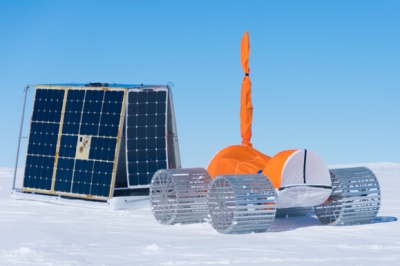Project Abstract
 This research project seeks fundamental understanding of the dynamics of wheeled vehicles moving through soft terrain such as snow and sand. The project will derive models of movement that incorporate improved descriptions of interactions between the wheels and the ground. These innovative models will allow the treatment of, for example, lightweight vehicles and easily crumbled terrain. These models will allow the robot to predict when it is in danger of getting irrevocably stuck. New model-based control techniques will then allow the robot to avoid this danger, for example, by repeated compaction of the terrain, appropriate modulation of cable forces from a towed load, or simply revising the planned route. The results will be deployed in mobile ground robot systems capable of traversing Arctic regions untended, carrying or towing sensor packages to provide "ground truth" data for comparison to satellite or aircraft measurements. No lightweight autonomous mobile platform currently exists that can roam Arctic terrain autonomously for long periods of time, without becoming immobilized by pockets of low cohesion snow. This project builds upon the investigator's success with similar robots used in the more uniform and predictable terrain of the Antarctic. This project advances the national health, prosperity, and welfare by enabling long-range, long-duration scientific surveys of the Arctic region that will provide improved understanding of the response of Arctic systems to natural and human activity. This project also supports the NSF Big Idea on Navigating the New Arctic. Finally, the project will support new content in the interdisciplinary engineering design experience for Dartmouth undergraduates, and will provide new material to a hands-on Arctic science outreach program for high school students from the US, Denmark, and Greenland.
This research project seeks fundamental understanding of the dynamics of wheeled vehicles moving through soft terrain such as snow and sand. The project will derive models of movement that incorporate improved descriptions of interactions between the wheels and the ground. These innovative models will allow the treatment of, for example, lightweight vehicles and easily crumbled terrain. These models will allow the robot to predict when it is in danger of getting irrevocably stuck. New model-based control techniques will then allow the robot to avoid this danger, for example, by repeated compaction of the terrain, appropriate modulation of cable forces from a towed load, or simply revising the planned route. The results will be deployed in mobile ground robot systems capable of traversing Arctic regions untended, carrying or towing sensor packages to provide "ground truth" data for comparison to satellite or aircraft measurements. No lightweight autonomous mobile platform currently exists that can roam Arctic terrain autonomously for long periods of time, without becoming immobilized by pockets of low cohesion snow. This project builds upon the investigator's success with similar robots used in the more uniform and predictable terrain of the Antarctic. This project advances the national health, prosperity, and welfare by enabling long-range, long-duration scientific surveys of the Arctic region that will provide improved understanding of the response of Arctic systems to natural and human activity. This project also supports the NSF Big Idea on Navigating the New Arctic. Finally, the project will support new content in the interdisciplinary engineering design experience for Dartmouth undergraduates, and will provide new material to a hands-on Arctic science outreach program for high school students from the US, Denmark, and Greenland.
Existing vehicle-terrain models have been derived and validated for heavy vehicles, and it has been shown that the behavior of lightweight vehicles differs from what these models predict. As a result, it is difficult to anticipate lightweight robot behavior in low mobility conditions using current models. The goal of this project is to develop vehicle-terrain models for lightweight ground robots that includes all the important dynamics, and integrates those models with vehicle design and control to maximize mobility. The project will develop estimation methods to detect incipient immobilization and control methods to avoid immobilization by reshaping the terrain's shear stress capacity and modulating towed load. A modular robotic platform will be developed to acquire data for deriving and validating vehicle-terrain models and control approaches for lightweight robot models. The platform will allow rapid modification of wheel/grouser geometry, ground pressure, and drawbar load to obtain parametric data in situ. Higher fidelity vehicle-terrain models enable control schemes comprised of model-based prediction of incipient immobilization that trigger control modes to avoid immobilization and enable a robot to make forward progress through soft terrain.
Logistics Summary
This research advances lightweight autonomous robots for long duration operation in soft terrain through an integrated approach to design, modeling, and control of such robots to maximize mobility. Beginning in 2019 to 2021 researchers will build and instrument the modular robot chassis to be used to collect data for modelling. The first full winter will be dedicated to collecting parametric data followed by completion of the modelling effort, experimental model validation, and reporting of these results in archival publications. With data collection, researchers will also begin study of terrain shaping and load modulation through hybrid control to extend the mobility envelope of a vehicle. Researchers will use the modular chassis to embody the state machine for detecting and avoiding immobilization and experimentally validate this system during the final quarter of the project. Researchers will conduct the studies to acquire data for modeling using snow as an archetype for soft, friable terrain through winter access to snow-covered, frozen New Hampshire lakes. No Arctic fieldwork will be conducted.
Keywords
Robotics, terramechanics, mobility
Project Location
Dates
-Location
Hanover, NHMembers
Principal Investigator

